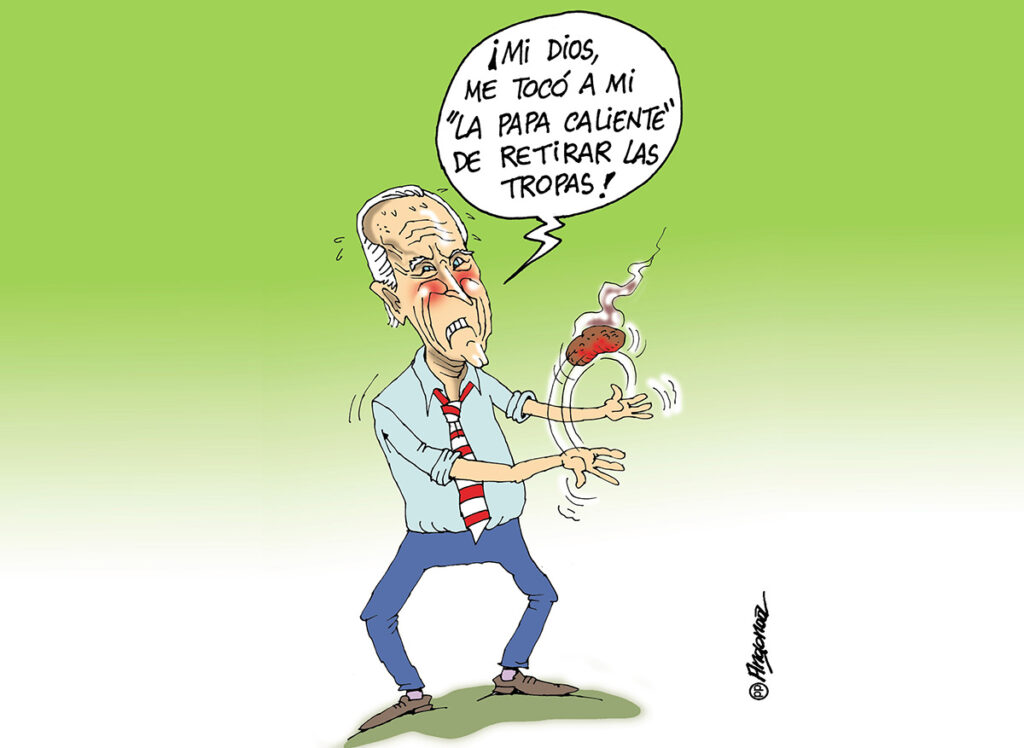
Jesús Sánchez Meleán
Haga click aquí para leer la versión en español
President Joe Biden didn’t hesitate for a second to go on camera to take full responsibility for the recent events in Afghanistan. On August 26th, two well-trained and radicalized Islamic State (IS) militants detonated explosives in areas protected by US soldiers in Kabul. One of the explosions occurred at the city airport and the other damaged a hotel near the airport terminal. Intelligence detected and warned of the imminent attacks, which reduced the number of casualties.
As Commander In Chief, it was his duty to assume responsibility. However, the mere discussion of tactical errors in the troop withdrawal operation in Afghanistan limits the full understanding of the complex juncture for the Biden administration and for the United States overall. Four American presidents began playing “hot potato” with the Afghanistan intervention, and it ended up falling into Biden’s hands.
The administrations of George W. Bush, Barak Obama and Donald Trump maintained and even increased the presence of troops in Afghanistan. These administrations also invested resources in creating and fostering the traditional institutions of Western democracies. Political organizations were created in Afghanistan to compete in elections. They approved a constitution that established the division of power according to the foundations of the theories of Montesquieu. And an army was established under the authority of civilians.
The strategy to end this intervention was discussed by all three of these administrations. The arguments for maintaining the intervention were always the same. The United States needed to stay longer for the new institutions to finish installing themselves and thus prevent the Taliban from taking power again. It was assumed that the return of the Taliban meant the possibility for terrorist groups to have protection, and to plan attacks against the US and other Western countries.
According to Bob Woodward in his two works on the Trump administration, the former Republican president was obsessed with the intervention of Afghanistan. Trump wondered publicly whether the US presence in that country would last a century. For Trump that intervention had no purpose and meant a waste of money. The former president directed his Secretary of State, Mike Pompeo, to seriously assess how to get out of Afghanistan.
In February 2020, Pompeo reached an agreement with the Taliban. The basis of the agreement included the pardon of a contingent of 200 Taliban activists who were in prison. In addition, the peaceful withdrawal of all US troops by May 1, 2021, was agreed upon with the support of the Taliban. And most importantly, in the case of forming a government, the Taliban promised not to welcome terrorists who would attack the US or other Western nations.
The US did not reach this agreement solely by the determination of Trump and Pompeo. The two parties, Republican and Democratic, involved had agreed to back this opportunity for Afghanistan. In the 20 years of the intervention, the impossibility of withdrawing the troops caused the death of 2,300 US soldiers. At the time of the largest military presence in Afghanistan, some 100,000 US soldiers were concentrated in that country. A recent report from the Department of the Treasury indicates that between November 2002 and December 2021, the United Stated spent about $882 billion in Afghanistan.
The Biden administration took over the Afghanistan intervention, keeping these costs in mind, as well as the human losses and the recent agreement between the US and the Taliban. Biden considered that he did not “have an alternative”. As he has been explaining, his only option was to continue with Trump’s agreement to remove US soldiers from Afghanistan. Had he ignored these US agreements, Biden would have had to bear the cost of escalating the war against the Taliban in that country.
In his interventions Biden has explained what he thinks about the possibility of such escalation. “I have never been of the view that we should be sacrificing American lives to try to establish a democratic government in Afghanistan – a country that has never been once in its entire history been a united country and is made up – and I don’t mean this in a derogatory manner – made up of different tribes that have never, ever, ever gotten along with each other”, said. And the raw reality is that after 20 years, a large part of the population sympathized with the Taliban’s style of authority.
Will Biden burn with this hot potato? We will continue to analyze this issue.

You may also like:
US Will Begin Third Dose on September 20
Pfizer Vaccine Approval Seeks to Convince Skeptics
Hispanic Brewers Display their Products in Denver






otras noticias
Antisemitism Strikes Colorado’s Jewish Community
Informal hot dog sales raise concerns in Denver
16th Street fills with free events and community activities